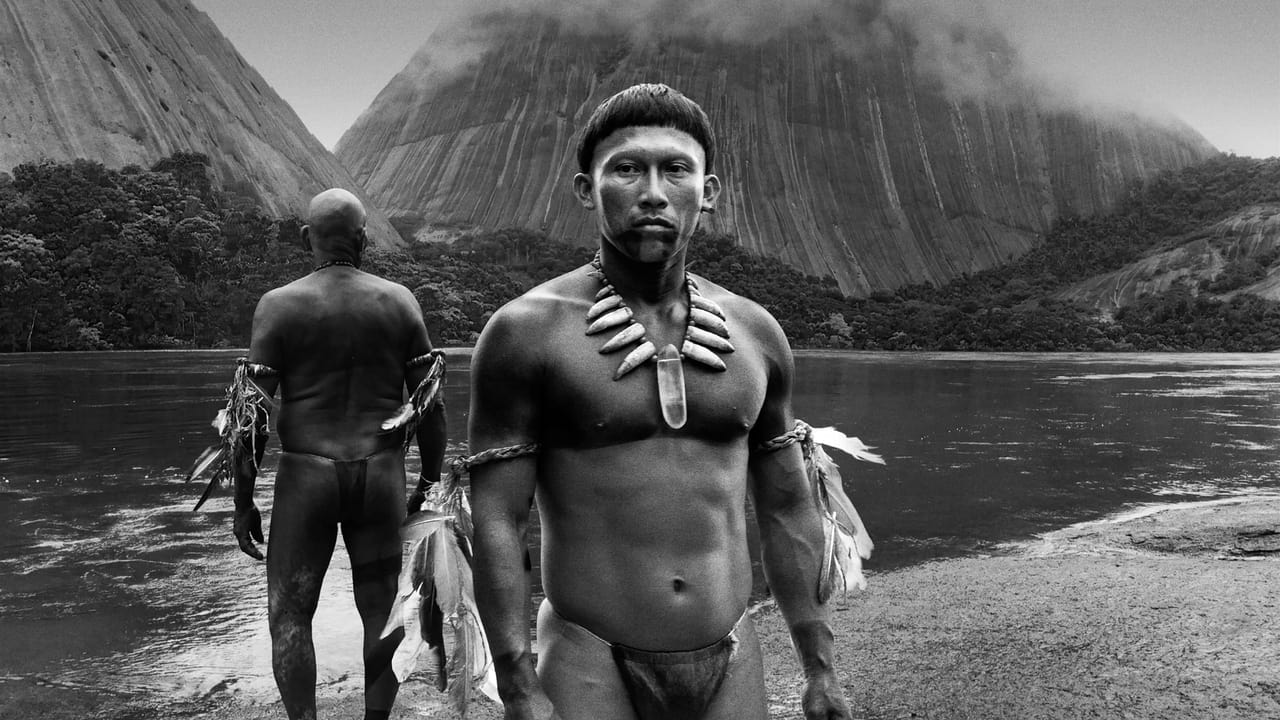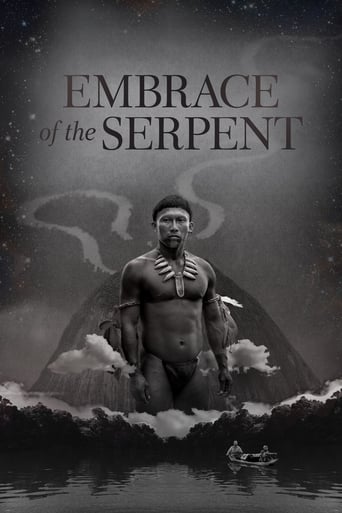

Phenomenal account of two explorers, 30 years apart, trying to find a mysterious healing plant in the Amazon jungle. We follow their journeys and see how the amazon is set to be torn apart by 'whites'. The shamen that is the last of his tribe leads both expeditions and teaches the explorers what it is to dream, be alive and at one with nature.There is one unforgettable moment when the expedition party encounters a rubber plant extractor. David Gallego's photography and the sound editing is just incredible. It's a unique spiritual experience. A remarkable film.
... View MoreThis movie is a special experience, taking us into the exotic Amazon jungles. When I'm watching, I'm not really sure whether I'm in Brazil, Argentina, Peru or Colombia. It's a little confusing but at times we do learn from the small details. Though, it doesn't matter too much. What strikes me is the way South America as a whole is a mixed pot of all the influences from other continents, particularly Europe... and how the native people are opposed to these changes. That for me is the heart of this film, this conflict between the native and the foreigner. There's sometimes a few clichés in this regard but the film does well to minimize this... that is the usual evil white man vs. the wise native. Nevertheless, this film is wise and deals with some big questions about man's greed, the exploitation of natural resources for dark means, corruption in nature and religion. I don't agree with everything it has to say, but whatever it did say was quite powerful and Embrace is an experience that is worth sacrificing your time for. There's not many films like it.
... View MoreIn early 20th century, Theodor von Martius is a German ethnographer from University of Tübingen cataloging the tribes of the Amazon. He gets sick and is brought to shaman Karamakate by his native guide Manduca. Karamakate distrusts the white men who cruelly run their rubber plantations or missionaries wiping out the native culture. He believes that he's the last of his tribe until Theo tells him about an isolated group of survivors. He guides them back to his former home to find a yakruna plant. About thirty years later, Evan arrives looking for Karamakate. He tells him that Theo died later and Manduca brought his diaries back to Germany to be published. Karamakate claims to be suffering from memory loss and only a hollowed shell copy called chullachaqui.The river journey is something like the Heart of Darkness. It portrays a harrowing vision of the struggles of the native community. It is enthralling. It is poetic. The characters are compelling. The only minor drawback is the ending which gets overextended. There is probably a quicker and more compelling way to wrap up the movie after what happened in the village. I like the surrealism in the end but it's just a little long.
... View More......................................................from Pasto,Colombia...Via: L.A. CA., CALI, COLOMBIA and ORLANDO, FL It isn't much of a leap to venture that the vast majority of IMDb Users have never seen a Colombian Film. If there is a single word in the above Title that grabs you, rest assured, you must "EMBRACE" this Oscar-nominated gem by placing it at the top of your "Must See" List! Colombian Director Ciro Guerra (Los Viajes del Viento/read my Review) has taken an Amazonian Shaman's reality-based Dream and crafted it into a visionary cinematic hallucination for the ages! The operative term here is "Culture-Clash". Two delicately intertwined story lines, both inspired by travel journals authored three decades apart by two Amazonian explorers; German scientist Theodor Koch-Grunberg (Jan Bijvoet, "Borgman"), in 1909, and by American amateur botanist Richard Evans Schultes (Brionne Davis, "Avenged"), thirty years later. EMBRACE opens a gritty and convincingly realistic window into the Colombian Amazon Region of the early 20th Century. Guerra gets up close and personal with some of the persistent cultural atrocities perpetrated on indigenous peoples in the Amazon region of Colombia, without dwelling inordinately on them. As if the three plus centuries of Spanish Colonial Rule had not provided enough genocide and torture!For those of you addicted to "Fast and Furious" pacing in movies, undoubtedly, will find EMBRACE a bit "Tedious and Slow", but I would say, "Deliberate and True to Life". One can, at best, barely imagine the laid- back life rhythms in remote regions of the Amazon a century ago! The intentional ever-so-slightly grainy Black & White cinematography imbues EMBRACE with an authentic 1930's look and feel. Of course, there have been numerous critiques of thusly having deprived us of the myriad of Amazon shades of green But EMBRACE is not a Travel Promo and I applaud Ciro Guerra's Black & White decision! Here is a comment/comparison you probably might not see anywhere else: Although Director Ciro Guerra was born in 1981, I can't help but think that, as a kid, he saw and was influenced by Stanley Kubrick's 1968, "2001" (My Favorite Movie)! There were, in my opinion, a number of interesting parallels, confirmation of which I will leave up to you! Shaman Karamakate, the last survivor of his tribe (Nibio Torres-young/Antonio Bolivar-old) who has been chewed up and spit out as a lifelong victim of culture clash, and, as a result, defines himself as "chullachaqui", a walking empty shell zombie of a man.EMBRACE is light years from being a feel-good movie, yet, there is a "spirituality and focus which can help you transcend even a worst- case scenario of mistreatment and misfortune in life", that is transformational and which provides ground swelling inspiration! This unique film would probably appeal to those who crave unusual true stories, those of you who enjoy Drama focused on a Clash of Cultures, and movies set in exotic locations! 10*.....ENJOY/DISFRUTELA!
... View More